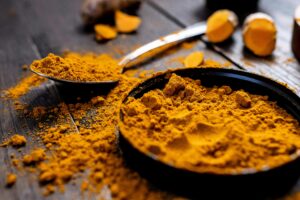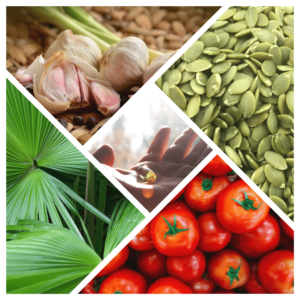Ginger, a widely used culinary spice and traditional medicine, boasts an array of active ingredients that contribute to its diverse health benefits. Gingerols, the primary pungent compounds, possess anti-inflammatory and antioxidant properties, potentially explaining ginger’s efficacy in reducing pain and inflammation. Shogaols, formed during drying or cooking, exhibit similar properties but may be even more potent. Additional bioactive compounds like paradols, zerumbone, and volatile oils likely contribute to ginger’s holistic effects [1].
Anti-Inflammatory Effects
Gingerols, the primary pungent compounds in ginger, possess anti-inflammatory and antioxidant properties, potentially explaining ginger’s efficacy in reducing pain and inflammation [1]. Shogaols, formed during drying or cooking, exhibit similar properties but may be even more potent [1]. Research suggests that ginger supplementation can improve symptoms of osteoarthritis (OA) by significantly reducing inflammatory markers such as erythrocyte sedimentation rate (ESR) and C-reactive protein (CRP) [1]. Moreover, ginger may offer benefits for individuals with relapsing-remitting multiple sclerosis (MS) by acting as an effective adjuvant therapy [9]. Systematic reviews and meta-analyses have also highlighted ginger’s positive impact on inflammatory and oxidative stress markers, including serum CRP, TNF-α, IL-6, TAC, and MDA levels [10,11].
Autoimmune Diseases
Ginger may ameliorate rheumatoid arthritis by modulating gene expression, potentially regulating T-cells [12]. Furthermore, ginger extract has shown promise in managing allergic rhinitis (AR), demonstrating efficacy comparable to loratadine in improving nasal symptoms and quality of life [13].
Cardiovascular Health
Ginger has shown potential to benefit cardiovascular health. A systematic review and meta-analysis of randomized controlled trials revealed that ginger consumption can lead to a reduction in blood pressure [2,3].
Metabolic Benefits
The metabolic benefits of ginger are also noteworthy. In individuals with type 2 diabetes mellitus (T2DM), ginger supplementation has been associated with significant reductions in fasting blood glucose, HbA1C, and systolic and diastolic blood pressure [3,4]. Additionally, ginger may play a role in improving non-alcoholic fatty liver disease (NAFLD) [5].
Digestive Aid
Ginger can alleviating gastrointestinal symptoms such as constipation, dysphagia, abdominal pain, diarrhoea, bloating, belching, flatulence, heartburn, anorexia, and nausea in individuals with RRMS [8].
References
- Mathieu S, Soubrier M, Peirs C, Monfoulet LE, Boirie Y, Tournadre A. A Meta-Analysis of the Impact of Nutritional Supplementation on Osteoarthritis Symptoms. Nutrients. 2022 Apr 12;14(8):1607. doi: 10.3390/nu14081607. PMID: 35458170; PMCID: PMC9025331.
- Hasani H, Arab A, Hadi A, Pourmasoumi M, Ghavami A, Miraghajani M. Does ginger supplementation lower blood pressure? A systematic review and meta-analysis of clinical trials. Phytother Res. 2019 Jun;33(6):1639-1647. doi: 10.1002/ptr.6362. Epub 2019 Apr 11. PMID: 30972845.
- Ebrahimzadeh A, Ebrahimzadeh A, Mirghazanfari SM, Hazrati E, Hadi S, Milajerdi A. The effect of ginger supplementation on metabolic profiles in patients with type 2 diabetes mellitus: A systematic review and meta-analysis of randomized controlled trials. Complement Ther Med. 2022 May;65:102802. doi: 10.1016/j.ctim.2022.102802. Epub 2022 Jan 11. PMID: 35031435.
- F. Shidfar, A. Rajab, T. Rahideh, N. Khandouzi, S. Hosseini, S. Shidfar. The effect of ginger (Zingiber officinale) on glycemic markers in patients with type 2 diabetes. J Complement Integr Med, 12 (2) (2015), pp. 165-170
- M. Morvaridzadeh, E. Sadeghi, S. Agah, S. Fazelian, et al. Effect of ginger (Zingiber officinale) supplementation on oxidative stress parameters: a systematic review and meta‐analysis. J Food Biochem, 45 (2) (2021), Article e13612
- Mathieu S, Soubrier M, Peirs C, Monfoulet LE, Boirie Y, Tournadre A. A Meta-Analysis of the Impact of Nutritional Supplementation on Osteoarthritis Symptoms. Nutrients. 2022 Apr 12;14(8):1607. doi: 10.3390/nu14081607. PMID: 35458170; PMCID: PMC9025331.
- Zhou Q, Peng Y, Chen F, Dai J. Ginger supplementation for the treatment of non-alcoholic fatty liver disease: a meta-analysis of randomized controlled trials. Afr Health Sci. 2023 Mar;23(1):614-621. doi: 10.4314/ahs.v23i1.65. PMID: 37545930; PMCID: PMC10398503.
- Foshati S, Poursadeghfard M, Heidari Z, Amani R. The effects of ginger supplementation on common gastrointestinal symptoms in patients with relapsing-remitting multiple sclerosis: a double-blind randomized placebo-controlled trial. BMC Complement Med Ther. 2023 Oct 27;23(1):383. doi: 10.1186/s12906-023-04227-x. PMID: 37891539; PMCID: PMC10605938.
- Foshati S, Poursadeghfard M, Heidari Z, Amani R. The effect of ginger (Zingiber officinale) supplementation on clinical, biochemical, and anthropometric parameters in patients with multiple sclerosis: a double-blind randomized controlled trial. Food Funct. 2023 Apr 24;14(8):3701-3711. doi: 10.1039/d3fo00167a. PMID: 36974730.
- Jalali M, Mahmoodi M, Moosavian SP, Jalali R, Ferns G, Mosallanezhad A, Imanieh MH, Mosallanezhad Z. The effects of ginger supplementation on markers of inflammatory and oxidative stress: A systematic review and meta-analysis of clinical trials. Phytother Res. 2020 Aug;34(8):1723-1733. doi: 10.1002/ptr.6638. Epub 2020 Mar 8. PMID: 32147845.
- Sheikhhossein F, Borazjani M, Jafari A, Askari M, Vataniyan E, Gholami F, Amini MR. Effects of ginger supplementation on biomarkers of oxidative stress: A systematic review and meta-analysis of randomized controlled trials. Clin Nutr ESPEN. 2021 Oct;45:111-119. doi: 10.1016/j.clnesp.2021.07.010. Epub 2021 Jul 24. PMID: 34620306.
- Aryaeian N, Shahram F, Mahmoudi M, Tavakoli H, Yousefi B, Arablou T, Jafari Karegar S. The effect of ginger supplementation on some immunity and inflammation intermediate genes expression in patients with active Rheumatoid Arthritis. Gene. 2019 May 25;698:179-185. doi: 10.1016/j.gene.2019.01.048. Epub 2019 Mar 4. PMID: 30844477.
- Yamprasert R, Chanvimalueng W, Mukkasombut N, Itharat A. Ginger extract versus Loratadine in the treatment of allergic rhinitis: a randomized controlled trial. BMC Complement Med Ther. 2020 Apr 20;20(1):119. doi: 10.1186/s12906-020-2875-z. PMID: 32312261; PMCID: PMC7171779.




